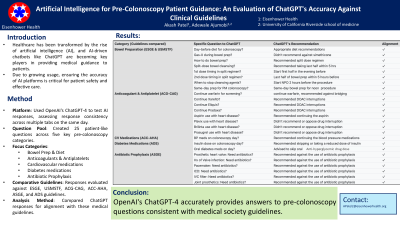Tuesday Poster Session
Category: General Endoscopy
P3395 - Artificial Intelligence for Pre-Colonoscopy Patient Guidance: An Evaluation of ChatGPT's Accuracy Against Clinical Guidelines
Tuesday, October 24, 2023
10:30 AM - 4:00 PM PT
Location: Exhibit Hall

Has Audio
- AP
Akash Patel, MD
Eisenhower Health
Rancho Mirage, CA
Presenting Author(s)
Award: Presidential Poster Award
Akash Patel, MD1, Adewale Ajumobi, MD, MBA, FACG2
1Eisenhower Health, Rancho Mirage, CA; 2Eisenhower Health, University of California, Rancho Mirage, CA
Introduction: The digital revolution has transformed healthcare. Patients use the internet and social media for medical advice.
Artificial intelligence (AI)-driven chatbots like OpenAI's ChatGPT are becoming increasingly popular sources of medical advice. Given this increasing interest, it is paramount to ensure the reliability and accuracy of information provided by these AI platforms. This study sought to evaluate the ability of ChatGPT to dispense advice aligned with established guidelines in response to patient queries regarding pre-colonoscopy care.
Methods: OpenAI's ChatGPT-4 was presented with a series of 25 patient-like questions, which covered four critical aspects of pre-colonoscopy care. These included the recommended diet, the protocol for bowel preparation, the management of cardiovascular medications (emphasizing anticoagulants, antiplatelets, anti-hypertensives,, and diabetes medications), and antibiotic prophylaxis in patients with prosthetic heart valves, heart valve infection, and those with implanted devices like pacemakers, implantable cardioverter-defibrillator (ICDs), inferior vena cava (IVC) filters, or prior joint prosthetics. The responses from ChatGPT were compared with guidelines from esteemed organizations, including the European Society of Gastrointestinal Endoscopy (ESGE), United States Multi-Society Task Force (USMSTF), American College of Gastroenterology-Canadian Association of Gastroenterology (ACG-CAG), American College of Cardiology-American Heart Association (ACC-AHA), American Society for Gastrointestinal Endoscopy (ASGE), and the Australian Diabetes Society (ADS).
Results: ChatGPT's responses to all 25 inquiries were found to align with the established guidelines. For queries regarding bowel preparation and diet, the responses were consistent with the ESGE and USMSTF guidelines. ChatGPT accurately mirrored the recommendations from the ACG-CAG for managing anticoagulants and antiplatelets. The AI's guidance on the management of cardiovascular medications and antibiotics prophylaxis conformed with ACC-AHA and ASGE guidelines, respectively. Furthermore, in terms of managing diabetes medications, ChatGPT's advice was in accordance with the ADS guidelines.
Discussion: OpenAI's ChatGPT-4 accurately provides answers to pre-colonoscopy questions consistent with medical society guidelines.
While AI-powered chatbots like ChatGPT may serve to enhance patient education and autonomy, they should complement, not replace, personalized advice from healthcare professionals.
Disclosures:
Akash Patel, MD1, Adewale Ajumobi, MD, MBA, FACG2. P3395 - Artificial Intelligence for Pre-Colonoscopy Patient Guidance: An Evaluation of ChatGPT's Accuracy Against Clinical Guidelines, ACG 2023 Annual Scientific Meeting Abstracts. Vancouver, BC, Canada: American College of Gastroenterology.
Akash Patel, MD1, Adewale Ajumobi, MD, MBA, FACG2
1Eisenhower Health, Rancho Mirage, CA; 2Eisenhower Health, University of California, Rancho Mirage, CA
Introduction: The digital revolution has transformed healthcare. Patients use the internet and social media for medical advice.
Artificial intelligence (AI)-driven chatbots like OpenAI's ChatGPT are becoming increasingly popular sources of medical advice. Given this increasing interest, it is paramount to ensure the reliability and accuracy of information provided by these AI platforms. This study sought to evaluate the ability of ChatGPT to dispense advice aligned with established guidelines in response to patient queries regarding pre-colonoscopy care.
Methods: OpenAI's ChatGPT-4 was presented with a series of 25 patient-like questions, which covered four critical aspects of pre-colonoscopy care. These included the recommended diet, the protocol for bowel preparation, the management of cardiovascular medications (emphasizing anticoagulants, antiplatelets, anti-hypertensives,, and diabetes medications), and antibiotic prophylaxis in patients with prosthetic heart valves, heart valve infection, and those with implanted devices like pacemakers, implantable cardioverter-defibrillator (ICDs), inferior vena cava (IVC) filters, or prior joint prosthetics. The responses from ChatGPT were compared with guidelines from esteemed organizations, including the European Society of Gastrointestinal Endoscopy (ESGE), United States Multi-Society Task Force (USMSTF), American College of Gastroenterology-Canadian Association of Gastroenterology (ACG-CAG), American College of Cardiology-American Heart Association (ACC-AHA), American Society for Gastrointestinal Endoscopy (ASGE), and the Australian Diabetes Society (ADS).
Results: ChatGPT's responses to all 25 inquiries were found to align with the established guidelines. For queries regarding bowel preparation and diet, the responses were consistent with the ESGE and USMSTF guidelines. ChatGPT accurately mirrored the recommendations from the ACG-CAG for managing anticoagulants and antiplatelets. The AI's guidance on the management of cardiovascular medications and antibiotics prophylaxis conformed with ACC-AHA and ASGE guidelines, respectively. Furthermore, in terms of managing diabetes medications, ChatGPT's advice was in accordance with the ADS guidelines.
Discussion: OpenAI's ChatGPT-4 accurately provides answers to pre-colonoscopy questions consistent with medical society guidelines.
While AI-powered chatbots like ChatGPT may serve to enhance patient education and autonomy, they should complement, not replace, personalized advice from healthcare professionals.
Disclosures:
Akash Patel indicated no relevant financial relationships.
Adewale Ajumobi indicated no relevant financial relationships.
Akash Patel, MD1, Adewale Ajumobi, MD, MBA, FACG2. P3395 - Artificial Intelligence for Pre-Colonoscopy Patient Guidance: An Evaluation of ChatGPT's Accuracy Against Clinical Guidelines, ACG 2023 Annual Scientific Meeting Abstracts. Vancouver, BC, Canada: American College of Gastroenterology.

